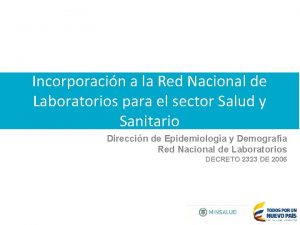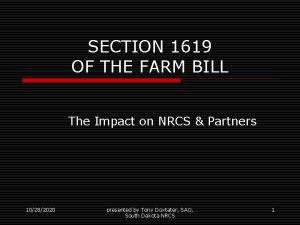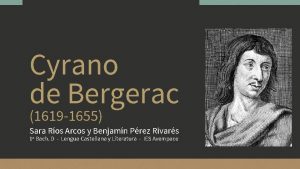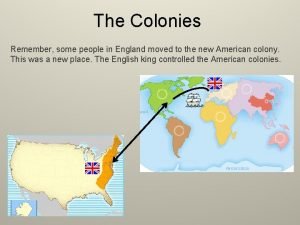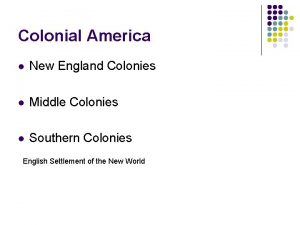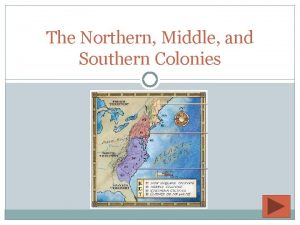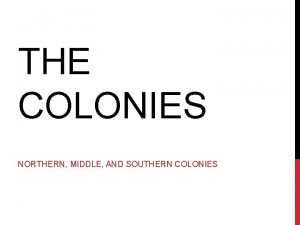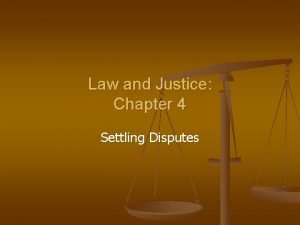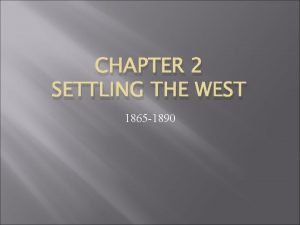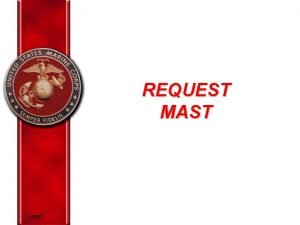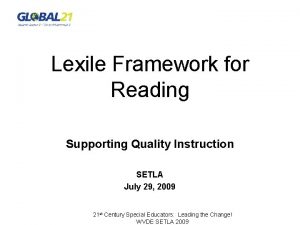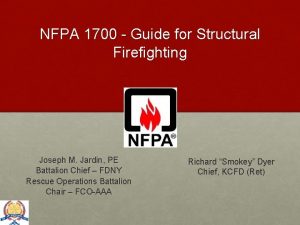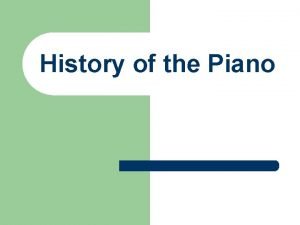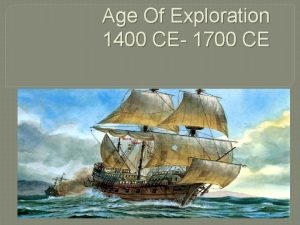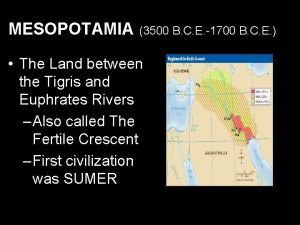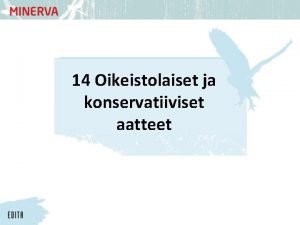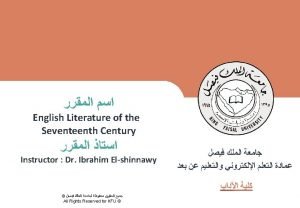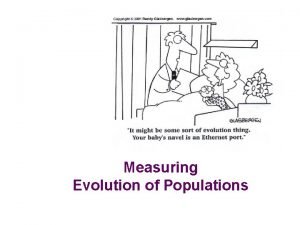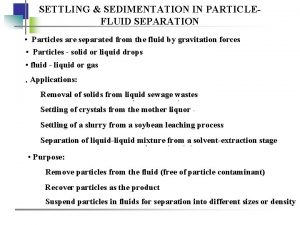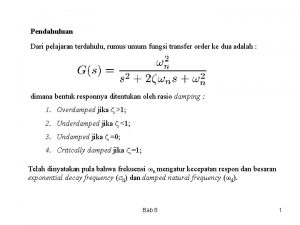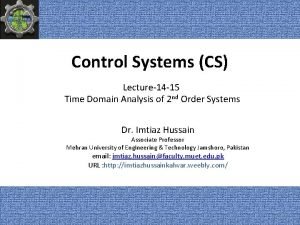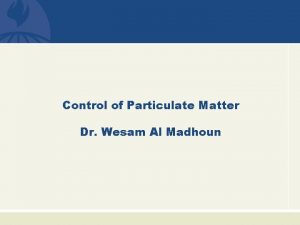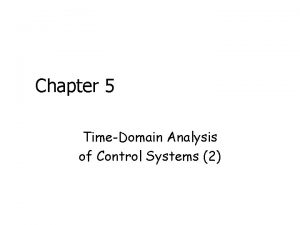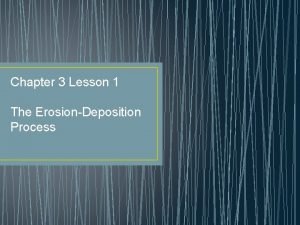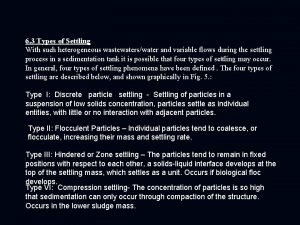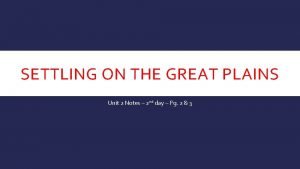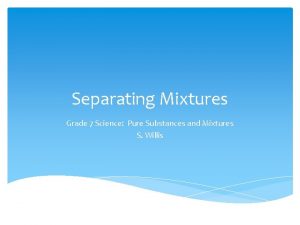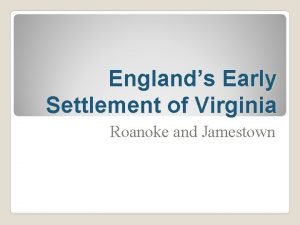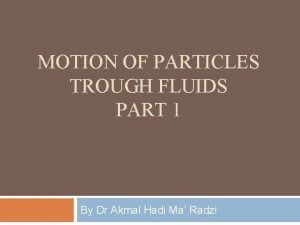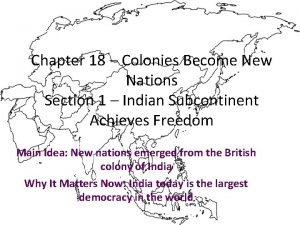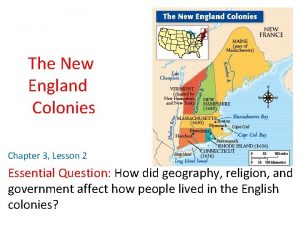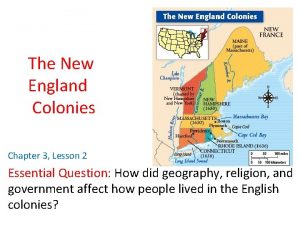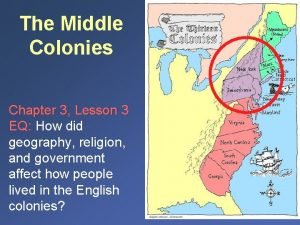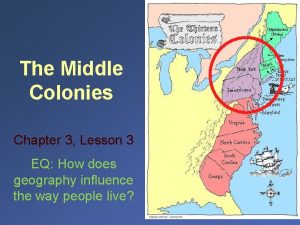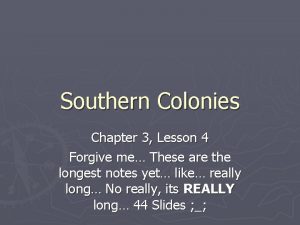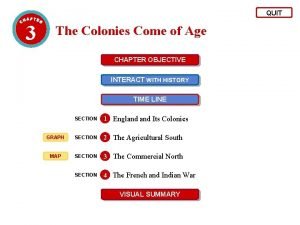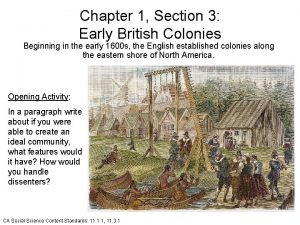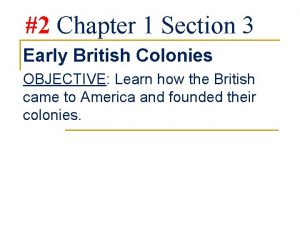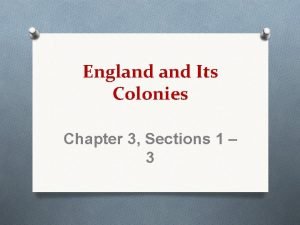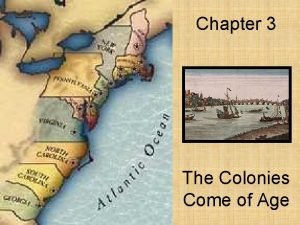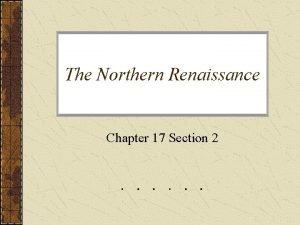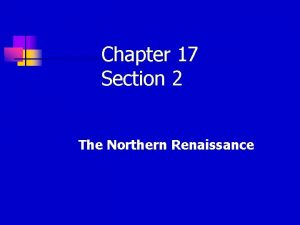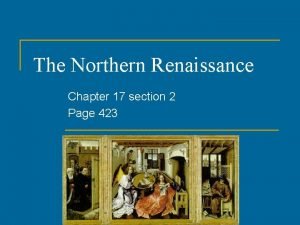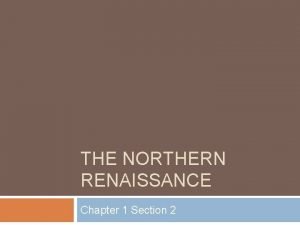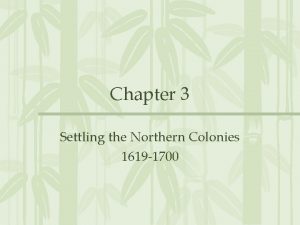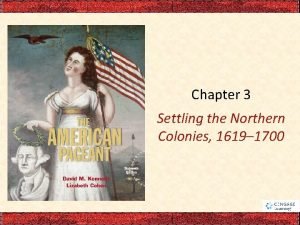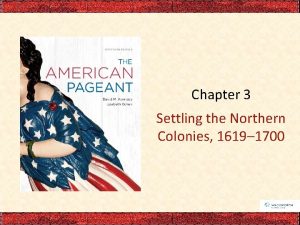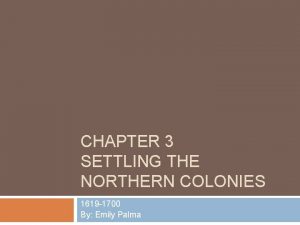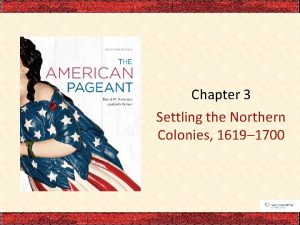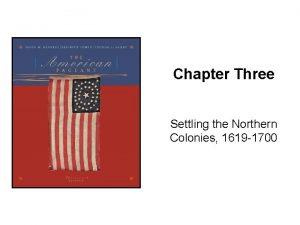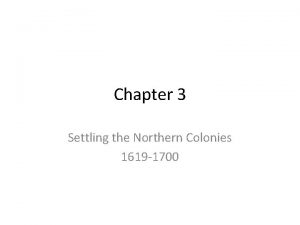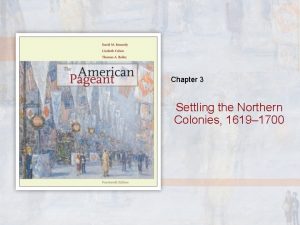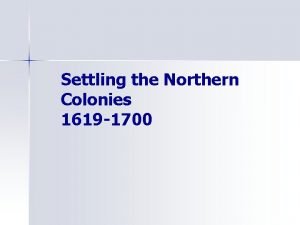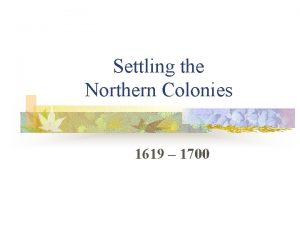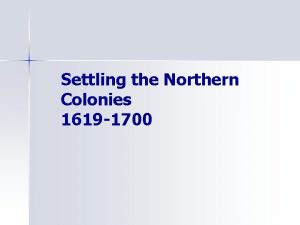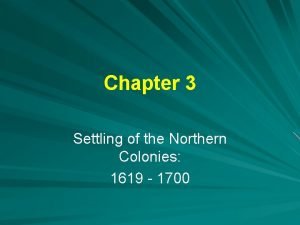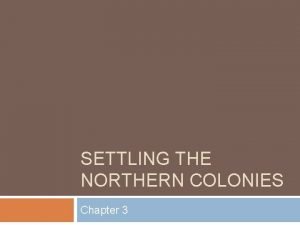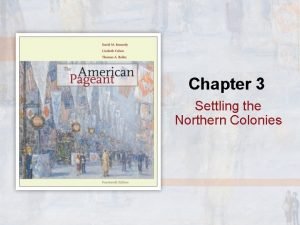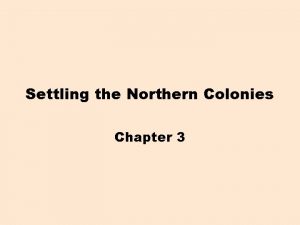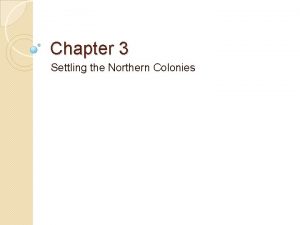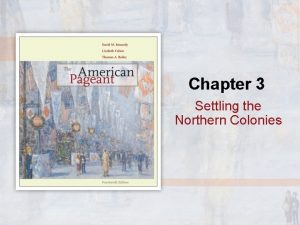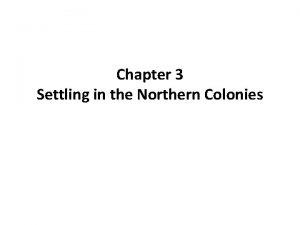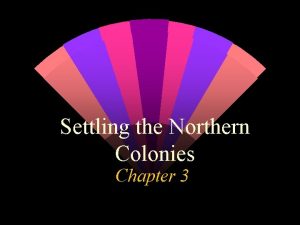Chapter 3 Settling the Northern Colonies 1619 1700







![seditious • - Concerning resistance to or rebellion against the government. "[His was] a seditious • - Concerning resistance to or rebellion against the government. "[His was] a](https://slidetodoc.com/presentation_image_h/0b385458424c04293157677f7083e0b4/image-8.jpg)
























































- Slides: 64

Chapter 3: Settling the Northern Colonies, 1619 -1700

predestination • - The Calvinist doctrine that God has foreordained some people to be saved and some to be damned. "Good works could not save those whom ‘predestination' had marked for the infernal fires. "

elect • - In Calvinist doctrine, those who have been chosen by God for salvation. "But neither could the elect count on their predetermined salvation. . "

conversion • A religious turn to God, thought by Calvinists to involve an intense, identifiable person experience. "They constantly sought, in themselves and others, signs of ‘conversion. '. . . " describing other information about the population.

visible saints • - In Calvinism, those who publicly proclaimed their experience of conversion and were expect to lead godly lives. "all Puritans agreed that only ‘visible saints' should be admitted to church membership. "

calling • - In Protestantism, the belief that saved individuals have a religious obligation to engage in worldly work. "Like John Winthrop, the [the Puritans] believed in the doctrine of a ‘calling' to do God's work on this Earth. "

heresy • - Departure from correct or officially defined belief. ". . . she eventually boasted that she had come by her beliefs through a direct revelation from God. This was even higher heresy. "
![seditious Concerning resistance to or rebellion against the government His was a seditious • - Concerning resistance to or rebellion against the government. "[His was] a](https://slidetodoc.com/presentation_image_h/0b385458424c04293157677f7083e0b4/image-8.jpg)
seditious • - Concerning resistance to or rebellion against the government. "[His was] a seditious blow at the Puritan idea of government's very purpose. "

commonwealth • - An organized civil government or social order. "They were allowed, in effect, to become semiautonomous commonwealths. "

autocratic • - Absolute or dictatorial rule. "An autocratic spirit survived, and the aristocratic element gained strength. . "

passive resistance • - Nonviolent action or opposition to authority in accord with religious or moral beliefs. "As advocated of passive resistance, [the Quakers] would. . . rebuild their meetinghouse on the site where their enemies had torn it down. "

asylum • - A place of refuge and security, especially for the persecuted or unfortunate. "Eager to establish an asylum for his people. . "

census • - An official count of population, often also describing other information about the population. ". . . an official census revealed that only about two thousand Indians remained in Virginia. . "

proprietary • - Concerning exclusive legal ownership, as of colonies granted to individuals by the monarch. "Penn's new proprietary regime was unusually liberal. . "

naturalization • - The granting of citizenship to foreigners or immigrants. "No restrictions were placed on immigration, and naturalization was made easy. "

blue laws • - Laws designed to restrict personal behavior in accord with a strict code of morality. "Even so, there were some ‘blue laws' aimed at ‘ungodly revelers. '. . "

ethnic • - Concerning diverse peoples or cultures, specifically those of non. Anglo-Saxon background. ". . . Pennsylvania attracted a rich mix of ethnic groups. "

census • - An official count of population, often also describing other information about the population. ". . . an official census revealed that only about two thousand Indians remained in Virginia. . "


Protestant Reformation • Sixteenth-century religious reform movement begun by Martin Luther

Puritans • English Calvinists who sought a thorough cleansing of the Church of England while remaining officially within that church

Separatists • Radical Calvinists who considered the Church of England so corrupt that they broke with it and formed their own independent churches

Congregationalist • The name eventually applied to the Puritans’ established church in Massachusetts and several other New England colonies.

fishing and shipbuilding • The two major non-farming industries of Massachusetts Bay

Mayflower Compact • The shipboard agreement by the Pilgrim Fathers to establish a body politic and submit to majority rule

Cambridge University • The elite English university where John Cotton and many other Puritan leaders of New England had been educated

antinomianism • Anne Hutchinson’s heretical belief that the truly saved need not obey human or divine law

banishment or exile • Common fate of Roger Williams and Anne Hutchinson after they were convicted of heresy in Massachusetts Bay

Pequot War • Vicious war waged by English settlers and their Narragansett Indian allies that virtually annihilated a major Indian tribe in Connecticut

King Phillip’s War • A major pan-Indian uprising of 1675– 1676 that destroyed many Puritan towns but ultimately represented a major defeat for New England’s Indians

Glorious Revolution • English revolt of 1688– 1689 that overthrew the Catholic King James II and also led to the overthrow of the Dominion of New England in America

patroonships • Vast feudal estates in the rich Hudson River valley that created an aristocratic elite in the New Netherland later New York colony

blue laws • Collective term for the Pennsylvania statutes that prohibited theater, cards, dice, and other activities and games deemed immoral.

Philadelphia • William Penn’s “city of brotherly love” that became the most prosperous and tolerant urban center in England’s North American colonies

Puritans • Dominant religious group in Massachusetts Bay

William Penn • Founder of the most tolerant and democratic of the middle colonies

Baptists • Dissenting religious group first founded in America in Rhode Island by Roger Williams

Plymouth • Small colony that eventually merged into Massachusetts Bay

Anne Hutchinson • Religious dissenter convicted of the heresy of antinomianism

King Philip • Indian leader who waged an unsuccessful war against New England’s white colonists

Martin Luther • German monk who began Protestant Reformation

Quakers • Religious group persecuted in Massachusetts and New York but not in Pennsylvania

General Court • Representative assembly of Massachusetts Bay

John Winthrop • Promoter of Massachusetts Bay as a holy “city upon a hill”

Peter Stuyvesant • Conqueror of New Sweden who later lost New Netherland to the English

John Calvin • Reformer whose religious ideas inspired English Puritans, Scotch Presbyterians, French Huguenots, and Dutch Reformed

Massasoit • Wampanoag chieftain who befriended English colonists

Massachusetts Bay Colony • Colony whose government sought to enforce God’s law on believers and unbelievers alike

Roger Williams • Radical founder of the most tolerant New England colony

Protestant Reformation • Sixteenth-century religious reform movement begun by Martin Luther

Puritans • English Calvinists who sought a thorough cleansing of the Church of England while remaining officially within that church

Separtists • Radical Calvinists who considered the Church of England so corrupt that they broke with it and formed their own independent churches

Mayflower Compact • The shipboard agreement by the Pilgrim Fathers to establish a body politic and submit to majority rule

Congregationalist • The name eventually applied to the Puritans’ established church in Massachusetts and several other New England colonies

Cambridge • The elite English university where John Cotton and many other Puritan leaders of New England had been educated

Fishing & shipbuilding • The two major non-farming industries of Massachusetts Bay

antinomianism • Anne Hutchinson’s heretical belief that the truly saved need not obey human or divine law

banishment or exile • Common fate of Roger Williams and Anne Hutchinson after they were convicted of heresy in Massachusetts Bay

Pequot War • Vicious war waged by English settlers and their Narragansett Indian allies that virtually annihilated a major Indian tribe in Connecticut

King Phillip’s War • A major pan-Indian uprising of 1675– 1676 that destroyed many Puritan towns but ultimately represented a major defeat for New England’s Indians

Glorious Revolution • English revolt of 1688– 1689 that overthrew the Catholic King James II and also led to the overthrow of the Dominion of New England in America

patroonships • Vast feudal estates in the rich Hudson River valley that created an aristocratic elite in the New Netherland later New York colony

blue laws • Collective term for the Pennsylvania statutes that prohibited theater, cards, dice, and other activities and games deemed immoral.

Philadelphia • William Penn’s “city of brotherly love” that became the most prosperous and tolerant urban center in England’s North American colonies
 Resolución 1619
Resolución 1619 Farm tools 1619
Farm tools 1619 Sara ja6
Sara ja6 Northern colonies
Northern colonies L
L Northern middle southern colonies
Northern middle southern colonies What are the names of the southern colonies
What are the names of the southern colonies Chapter 4 settling disputes
Chapter 4 settling disputes Settling the west 1865-1890
Settling the west 1865-1890 Mco 1700
Mco 1700 Lexile analyzer
Lexile analyzer Nfpa 1700
Nfpa 1700 1700 piano
1700 piano 1700 ce
1700 ce 3500 bce
3500 bce Eta 1700
Eta 1700 Rivoluzione agricola 1700
Rivoluzione agricola 1700 1700 luvun aatesuunta
1700 luvun aatesuunta Rotazione quadriennale 1700
Rotazione quadriennale 1700 The puritan age
The puritan age 1700/1600
1700/1600 Mechanisms of evolution
Mechanisms of evolution Mobility express
Mobility express 1700 bce
1700 bce Where can we find rotating arm sprays in sewage treatment
Where can we find rotating arm sprays in sewage treatment Hazen formula for settling velocity
Hazen formula for settling velocity What is hindered settling
What is hindered settling Differential settling method
Differential settling method Flotation and settling
Flotation and settling Natural frequency transfer function
Natural frequency transfer function Gravitational settling chamber
Gravitational settling chamber Detention time in sedimentation tank
Detention time in sedimentation tank Damping ratio in control system
Damping ratio in control system Settling time control system
Settling time control system Gravitational settling chamber
Gravitational settling chamber Dominant poles
Dominant poles What is the laying down or settling of eroded material?
What is the laying down or settling of eroded material? Gravitational settling chamber
Gravitational settling chamber Settling types
Settling types Settling velocity
Settling velocity An ideal horizontal flow settling basin
An ideal horizontal flow settling basin Settling on the great plains section 2
Settling on the great plains section 2 Separating mechanical mixtures
Separating mechanical mixtures Late charge in front office
Late charge in front office Settling jamestown
Settling jamestown Settling the west part 2 packet- farming the plains
Settling the west part 2 packet- farming the plains Define terminal settling velocity
Define terminal settling velocity Yshss
Yshss The colonies become new nations
The colonies become new nations The colonies become new nations
The colonies become new nations Colony
Colony Who was the founder of the new england colonies
Who was the founder of the new england colonies Chapter 3 lesson 3 the middle colonies
Chapter 3 lesson 3 the middle colonies Colonial america lesson 3 the middle colonies
Colonial america lesson 3 the middle colonies Chapter 3 lesson 4 the southern colonies
Chapter 3 lesson 4 the southern colonies Chapter 3 the colonies come of age answer key
Chapter 3 the colonies come of age answer key Chapter 1 section 3 early british colonies
Chapter 1 section 3 early british colonies Chapter 1 section 3 early british colonies
Chapter 1 section 3 early british colonies Chapter 3 section 1 england and its colonies
Chapter 3 section 1 england and its colonies Chapter 3 the colonies come of age
Chapter 3 the colonies come of age Northern renaissance literature
Northern renaissance literature Landmark cinemas
Landmark cinemas Chapter 17 section 2 the northern renaissance
Chapter 17 section 2 the northern renaissance Where did the northern renaissance began
Where did the northern renaissance began Hát kết hợp bộ gõ cơ thể
Hát kết hợp bộ gõ cơ thể
